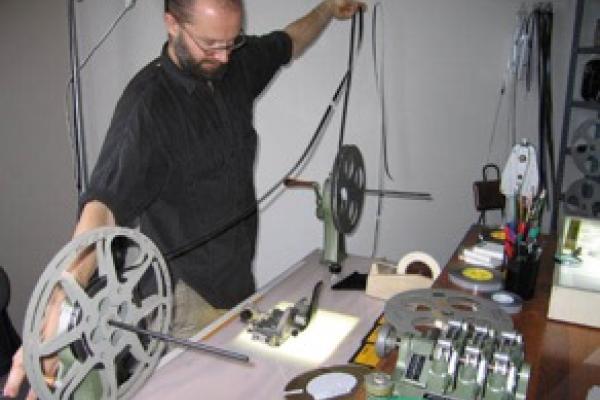
David Gatten
Program in the Arts of the Moving Image
Duke University
Over the last 15 years, David Gatten (b. 1971 in Ann Arbor, Michigan) has explored the intersection of the printed word and moving image. The resulting body of work illuminates a wide array of historical, conceptual and material concerns, while cataloging the variety of ways in which texts function in cinema as both language and image, writing and drawing, often times blurring the boundary between these categories. Using traditional research methods (reading old books) and non-traditional film processes (boiling old books) the films trace the contours of private lives and public histories, combining philosophy, biography and poetry with experiments in cinematic forms and narrative structures. Exploring the archive in unexpected ways and making connections across categories of knowledge and fields of meaning, Gatten's films construct new compositions and generate novel conclusions from 19th c. scientific treatises, "out-dated" 20th c. instructional texts, and rare books from 17th and 18th century personal libraries. Among the leading figures in a diverse movement dedicated to mining the fullness of 16mm film’s expressive possibilities in the digital era, David Gatten – in the words of film scholar Scott MacDonald – “continues to find new creative possibilities in the continued premonitions of film’s demise.” A recent Film Comment critics’ poll of avant-garde cinema in the 2000’s saw Gatten place within the top ten filmmakers and included two of his films in a list of the fifty best individual works of the decade. Gatten's films premiere annually at Lincoln Center in the New York Film Festival and his films have been included twice in the Whitney Biennial. They are screened regularly in the world's most prestigious film festivals, museums and galleries. His work resides in the permanent collections of the British Film Institute, the Whitney Museum of American Art and the Art Institute of Chicago, as well as in numerous university and private collections. Gatten's films are included on over two dozen film history syllabi at universities and colleges in the US, Canada and Europe. They have won more than twenty awards at festivals around the world since 1997. In 2005 Gatten was awarded a Guggenheim Fellowship to continue his film series investigating the library of William Byrd, which Artforum called “one of the most erudite and ambitious undertakings in recent cinema.” A former Associate Professor & Chair of the Department of Cinema & Photography at Ithaca College, Gatten has also taught the history, theory and practice of filmmaking at the School of the Art Institute of Chicago and at The Cooper Union for the Advancement of Science & Art in New York City. He is the recipient of two awards for Excellence in Teaching.
The Moving Image Production Working Group, coordinated by Ron Green (History of Art) and John Davidson (Germanic Languages and Literatures), aims to stimulate intellectual discussion and community among scholars and citizens of central Ohio around the issues of academic moving-image production. Moving Image is defined as all past, current, and future forms of the audio-visual media arts, such as film, video, television, digital video, animation, and new media. The group will function to bring together disparate interests to sift through the existing resources at OSU; import advice from experienced leadership internationally in order to explore alternative visions; and build on the experience of the OSU Interdisciplinary Film Studies Committee, which founded the successful Film Studies Program in 2006. A final proposal, by Spring 2012, will define a new interdisciplinary academic program in Moving Image Production.
